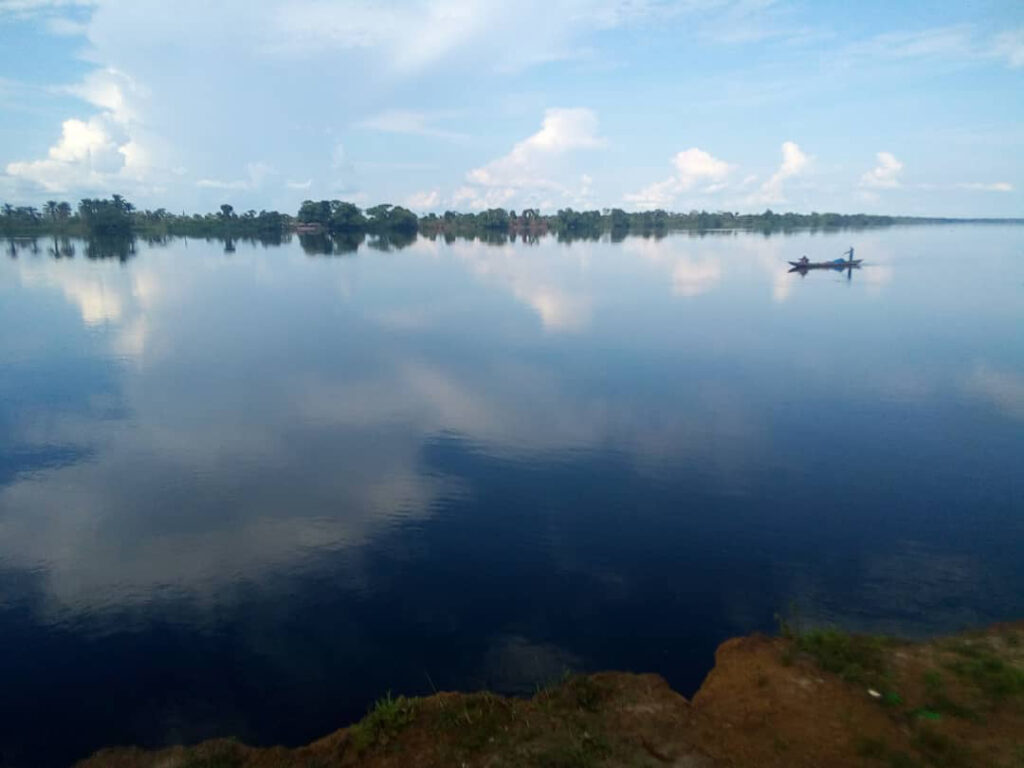Facing Difficult Situations
Bryan Parrish serves with the Church of Christ in Congo.
At least once a year, the Church of Christ in Congo organizes an executive board meeting with the presidents of the eleven ecclesiastical regions, the national bureau, and the staff. The last meeting was held for four days in May (May 19-23) and the theme chosen for this session was, “The Church Faces Difficult Situations,” inspired by Paul’s second letter to Timothy 3:1-11. I do not think we could have found a better theme.
The Democratic Republic of Congo (DRC) faces many challenges and many crises and the Church does as well. Much of the session was to examine the life of the Church and make many important decisions. The other critical issue was to analyze and share the concerns of the socio-political situation of the Democratic Republic of Congo. Many of our discussions were about the “situation in the East.” After years of massacres of civilians by militias mainly to drive families from their homes to pillage the natural resources, the government declared on May 5th a state of siege in North Kivu and Ituri with military commanders taking the responsibility of the administration. For the moment, the results are mixed at best. During our meeting, on May 21st, we learned of the slaughter of 51 civilians in Ituri in just one night.
The next day, during our final session, a wave of panic arrived with the announcement of the eruption of the volcano Nyiragongo in Goma, in North Kivu. At that time, we did not know the extent of the damage, but everyone had in mind the eruption of 2002, which caused the death of more than 120 and destroyed much of the city of more than 2,000,000.
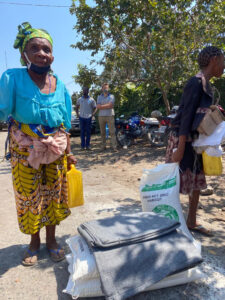
The president of the Synod North Kivu, Bishop Mbala led us in a moving prayer. The following day, we already had the first reports from the congregations of the different communities in Goma. More than 1200 families lost their homes, crops ready to harvest were burnt, churches were destroyed, and 15 persons lost their lives in the lava or in the panic of escaping.
When a catastrophe of this proportion strikes the population, the Church must react quickly with efficiency. The Protestant Development Service and Diaconia (SEPRODDIA in French) sounded the alert to raise funds for the population of Goma. The quick response of Global Ministries was helpful, bringing emergency help to the population that needed supplies to survive. More than 500,000 inhabitants were evacuated after the eruption and have since returned to their homes. Problems persist for the families who lost their homes and crops.
After the crises in Goma, we met frequently with Bishop Mbala who was still in Kinshasa to coordinate the emergency response. With great sadness, we learned on the 21st of June that Bishop Mbala died from Covid-19 on his return to Goma.
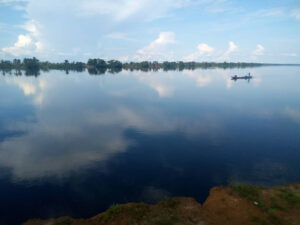
The Church of Christ in Congo is faced with another challenge – the fourth wave of the Coronavirus. The first three waves were not as bad, but the variant Delta has started to take its toll. Three of the 11 presidents of the ECC have been hospitalized with Covid-19 and one has died. Two of my co-workers have also been hospitalized and five others have tested positive. One of the biggest problems is the lack of vaccinations. Less than one percent of the population has been vaccinated with some estimates at less than 10,000 persons for a population of 90 million. In March, the World Health Organization sent 1.5 million doses of the AstraZeneca vaccine. Just when the vaccination campaign started, many European countries banned it. Not much more was needed to convince the Congolese population to not take the vaccine.
A new program of vaccination has been launched. Part of the problem is a lack of vaccines, and the other part is the mistrust in the vaccines that are available. ECC has begun to organize conferences to raise awareness and inform the population about the vaccines.
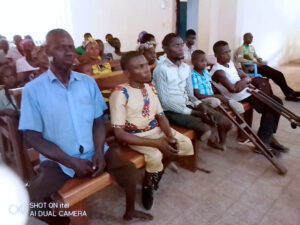
I would also like to share with you about my trip to Mbandaka in April. I was invited by the president and Bishop of the region of the Equateur, as was my co-worker who is also in charge of vulnerable persons for SEPRODDIA. We decided to invite Virgine Ndjoku who I have worked with for the last 7 months on her project on awareness and help for persons with disabilities.
We had two main goals for the trip: a campaign to help Virginie to start her project in Mbandaka and to exchange ideas with the members of the Synod and the different communities on SEPRODDIA. Of course, there also was a special reason for me during this trip – to better know the headquarters and the origins of the Disciples of Christ in Congo.
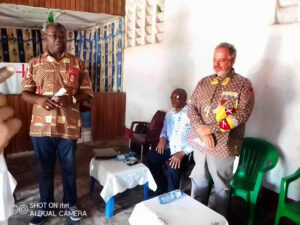
We were in Disciple country, and I was happy to share with the many Disciples who gave me such a warm welcome. A friend of my congregation in Kinshasa who is originally from Mbandaka was there. She introduced me to the mayor who is the son of a Disciples minister. The visit to Bolenge, which is next to Mbandaka, was a highlight of the trip. It was very moving and inspiring to see the houses of the missionaries who planted seeds for the Good News of Jesus Christ in Congo a little more than 120 years ago. According to president Bonanga, Bolenge is the “Jerusalem” for the Disciples in DRC.
We had a good visit with the staff of the hospital in Bolenge who explained their projects and their difficulties. The hospital in Bolenge is especially important for the region and part of the history of the Disciples in DRC.
I also spent time visiting the different activities of the Disciples and the Synod. I met with many women active in microcredit programs, which also project that SEPRODDIA is trying to develop on a larger scale. Pastor Mputu, the wife of the vice-president, was very gracious and took the time to share many activities with me such as the sewing classes for adolescent mothers and the pygmy people. She also gave me a live duck as a welcoming gift, but I was not able to keep it. The last night in Mbandaka, we all shared a big meal with my duck as the main course.
The president of the Disciples, Rev. Louis Eliki Bonanga had a ceremony for me to give me my Congolese name. This has been a source of suspense for the last few months since the minister of my congregation wanted me to be named for a missionary from the Disciples who came to Kinshasa, “Efofia.” The president would not hear of it and wanted a Kimongo name from Mbandaka. My official name from the Disciples is “Reverend Bondonga” which means “forest” in Kimongo. The minister of my congregation still calls me Efofia, so I will have a Congolese name in Mbandaka and another one in Kinshasa.
Bryan Parrish serves with the Church of Christ in Congo. His appointment is made possible by gifts to the Disciples Mission Fund, Our Church’s Wider Mission, and your special gifts.

